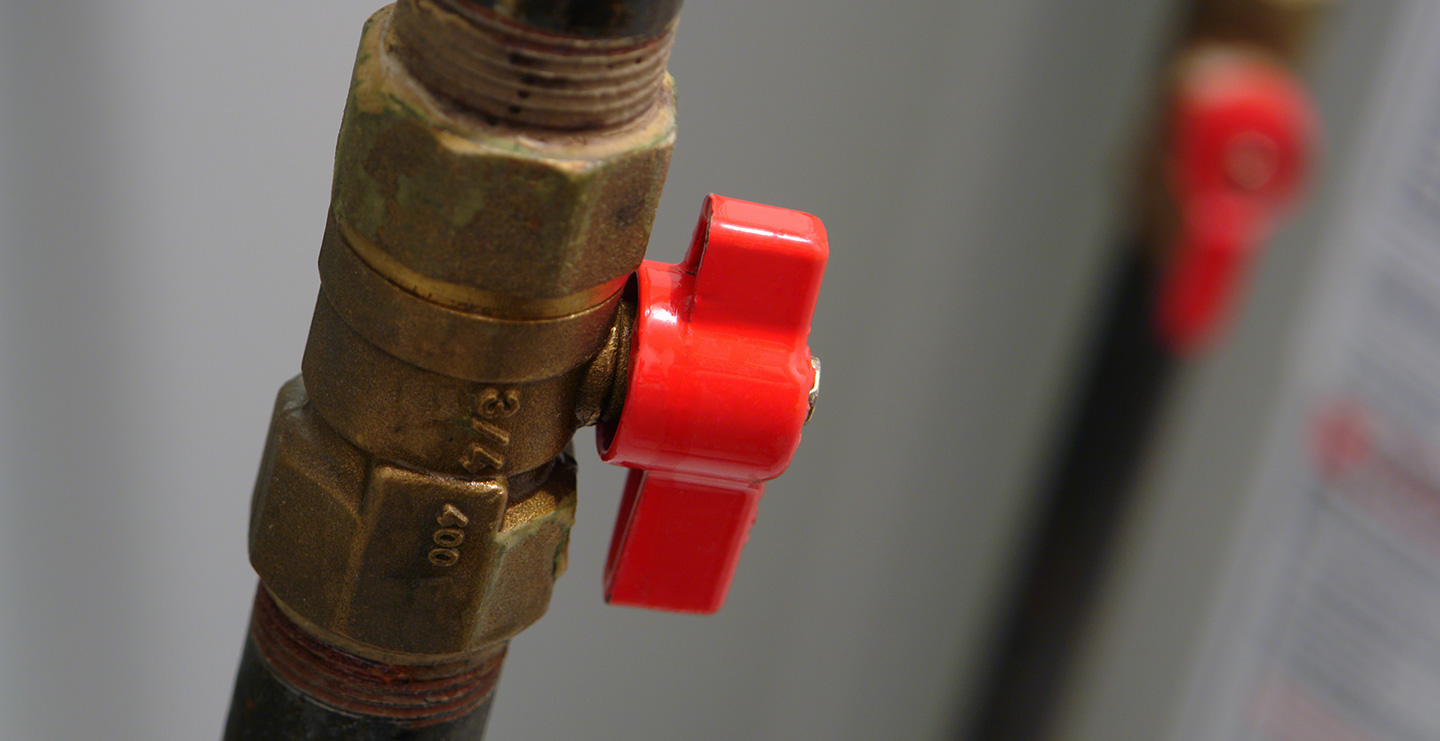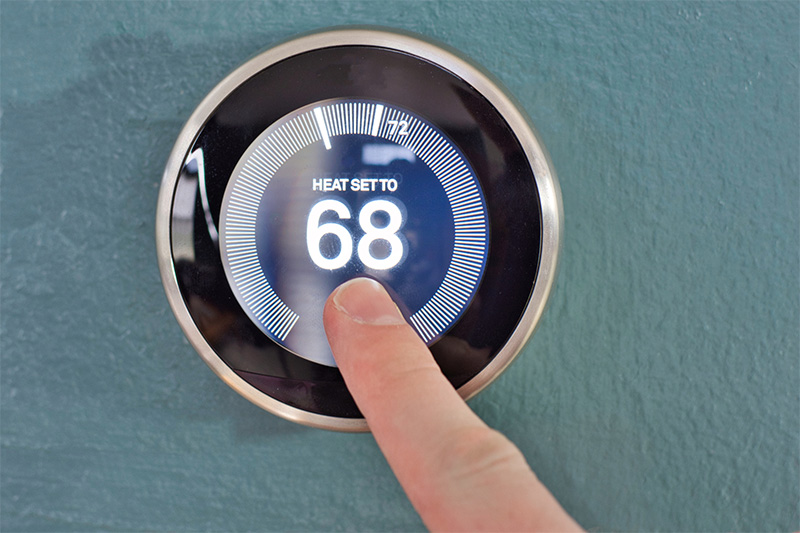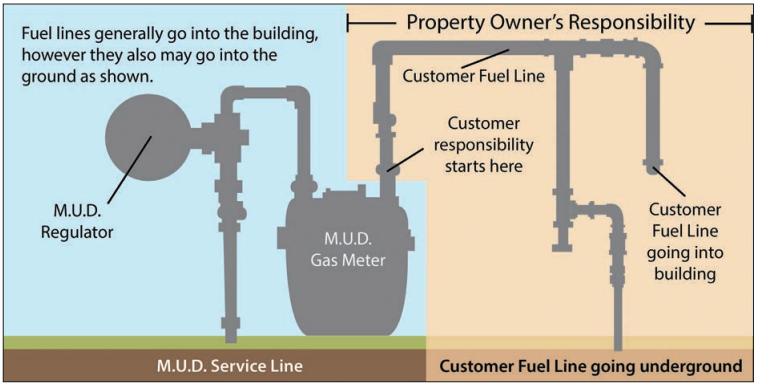WHAT IS AN EMERGENCY?
Gas leaks, odor of gas, damaged lines, carbon monoxide symptoms and water main breaks are all considered emergencies.
If you smell gas, do not attempt to locate the leak. Instead, leave the house or building right away. Do not use any electrical switches, appliances, lights, telephones, or mobile devices, as an electrical charge could create a spark. When you are in a safe place, call M.U.D.'s emergency hotline at 402.554.7777 or 9-1-1.
If someone is showing symptoms of carbon monoxide poisoning, call 9-1-1 immediately. Symptoms are like the flu.
If you have a water-related emergency, call 402.554.7777. Our personnel are ready to assist you 24/7. When in doubt, call us immediately.
Learn More¿QUÉ ES UNA EMERGENCIA?
Las fugas de gas, el olor a gas, las tuberías de gas dañadas, los síntomas de monóxido de carbono y roturas en las tuberías principales de agua son consideradas emergencias.
Si huele a gas, NO trate de localizar la fuga/escape. Al contrario, abandone la casa o el edificio inmediatamente. No utilice los interruptores eléctricos, electrodomésticos, luces, teléfonos o equipos móviles, ya que una carga eléctrica podría provocar una chispa. Una vez que se encuentre en un lugar seguro, entonces llame a la línea directa de emergencia de M.U.D. al 402.554.7777 o al 9-1-1.
Si alguien tiene síntomas de envenenamiento causados por el monóxido de carbono, llame al 9-1-1 inmediatamente. Los síntomas son como los de la gripe/catarro.
Si tiene una emergencia relacionada con el agua, llame al 402.554.7777. Nuestro personal está listo para ayudarle, 24/7. Cuando dude o crea que hay una emergencia, llámenos de inmediato.
Aprende MásOne of the easiest ways is to choose natural gas for your energy needs. Natural gas is domestically abundant and environmentally friendly. More than 90% of the energy produced as natural gas is delivered directly to your home, compared to just 27% for electric power. As a result, Carbon Dioxide is greatly reduced; up to a 75% decrease when using gas appliances. This quality is one reason why natural gas is the cleanest of all fossil fuels. Choose natural gas when replacing old appliances or building a new home. You save money, and retain market value of your home. Your choice will help the environment and future generations.
The Metropolitan Utilities District is the fifth largest public gas utility in the country; providing clean, efficient natural gas to more than 241,000 gas customers. Natural gas is an economical, safe, colorless and odorless gas. For easy detection, we add a chemical to give gas a distinctive odor. If you smell gas, leave the building or area, and then call our 24/7 emergency line at 402.554.7777 or 911. There’s no charge for checking gas leaks.
Benefits of Natural Gas
Clean

Reduce your carbon footprint with the cleanest of all fossil fuels.
Efficient

Natural gas is domestically abundant and environmentally friendly.
Affordable

More efficient. More savings. More money in your pocket.
Natural Gas Safety Tips
- Teach children about safety around appliances
- Do not use gas ovens to heat a room or for any purpose other than cooking. It could be dangerous to your safety and may damage the range or oven.
- Gas appliances need fresh air to work properly. Keep flues or ducts attached to gas appliances in good condition and clear to expel unwanted products of combustion, like carbon monoxide, from the house.
- If a pilot light or burner flame goes out, allow ample time for any gas accumulation to escape before relighting.
To download a natural gas safety brochure, click here.

Natural Gas Detection
Natural gas is an economical, safe, colorless and odorless fuel.
For easy detection, we add a chemical to give gas a distinctive odor like skunk, rotten eggs or sulfture. Natural gas is not poisonous, however it can displace oxygen in a room. Since it is lighter than air, natural gas dissipates quicker than propane or gasoline. While natural gas has a better safety record than any other major form of energy, its use requires caution.
Potential hazards may include fire, explosion, or suffocation; however, natural gas alone will not burn or explode. It needs the right amount of air and an ignition source. More than half of the reported natural gas accidents are caused by digging before utility lines are marked. Call 811 two business days before digging.
What is the gas odor?
Natural gas in its native state is colorless and odorless. Mercaptan is the additive that is added to natural gas to make it easier to detect in case of a leak. The most important thing to know about mercaptan is that it stinks. Some people compare it to the smell of skunk, rotten eggs or sulfur. In a concentrated form, its smell is almost unbearable.
Without it, leaks would be impossible to detect.
It takes only a few parts per million of mercaptan to give natural gas a smell, and that is precisely why we add it to natural gas.
If we did not add mercaptan, it would be difficult for you to know that unlit natural gas was coming from your stove after you left the valve turned on. And leaks from furnaces and hot water heaters would be nearly impossible to detect without expensive equipment.
So mercaptan’s smell is a very valuable safety feature.
-
What’s your responsibility? What’s ours?
Find out what you are responsible for, and what M.U.D. is responsible for, regarding your home gas system and service.
-
How do your appliances stack up?
Everyone wants to save money! Learn how natural gas appliances stack up against electric appliances.

Gas Rate Comparison
The District buys natural gas from a portfolio of suppliers in the U.S. and Canada. As an aggregator for our customer-owners, buying large volumes of gas enables us to negotiate the most economical price, allowing us to keep residential rates lower than the national average. To see current natural gas rates, visit “Rates and Fees” under the “My Bill” tab on our website. The M.U.D. Board of Directors sets the non-gas or fixed base part of the gas rate. The fixed base rate covers costs for operation, maintenance, and administration of gas plants and mains. The gas part of the rate, which fluctuates every month depending on the price at the wellhead, goes to buy natural gas.
Natural Gas Facts
View the latest M.U.D. Natural Gas Fact Sheet.
Demand
Natural gas supplies nearly one-fourth (22 percent) of all energy used in the U.S. In 2021, the U.S. consumed 30 trillion cubic feet of natural gas. Natural gas is clean, reliable, and American, which makes it increasingly popular.
Consumption
Electric Power Generation — More than half of the electricity generated in the U.S. is made from coal. Natural gas currently generates approximately 31% of the total U.S. electricity.
Natural gas is the dominant fuel of choice for new electric power generation plants because it is cleaner-burning. Also, natural gas combined-cycle plants can be built more quickly and less expensively than coal or nuclear facilities, which produces far more emissions than natural gas. So, using natural gas to replace electricity in heating systems and appliances reduces our carbon footprint and is better for the environment.
About 90% of the gas produced is delivered to the customer as usable energy. In contrast, only about 27% of the energy converted to electricity reaches the customer. On average, electricity costs four times more to use in your home than natural gas.
Supply
Natural gas is a domestic energy source. In 2006, nearly all of the natural gas consumed in the U.S. (81%) was produced in the U.S. Most of the rest (16%) came from Canada with 3% imported as liquefied natural gas (LNG)
According to the U.S. Energy Information Administration, with huge amounts of natural gas potentially available in shale formations, the U.S. could have to meet its current demand for more than 100 years. By one estimate, U.S. gas reserves now are equal in energy value to Saudi Arabia’s oil reserves. The ample gas supplies also have pushed prices down. U.S. consumers pay half the going wholesale rate in many other developed countries.
The natural gas supply picture changed with the potential of shale gas, which is being tapped with horizontal drilling methods and the improved use of water and chemicals to break up and recover gas in huge underground formations.
Delivery
The U.S. natural gas pipeline network is a highly integrated transmission and distribution grid that can transport natural gas to and from nearly any location in the lower 48 states.
The grid includes:
- More than 210 natural gas pipeline systems.
- 305,000 miles of interstate and intrastate transmission pipelines.
- More than 1,400 compressor stations that maintain pressure on the natural gas pipeline network and assure continuous forward movement of supplies.
- More than 11,000 delivery points, 5,000 receipt points, and 1,400 interconnection points that provide for the transfer of natural gas throughout the United States.
- 24 hubs or market centers that provide additional interconnections.
- 400 underground natural gas storage facilities.
- 49 locations where natural gas can be imported/exported via pipelines.
- 8 LNG (Liquefied Natural Gas) import facilities and 100 LNG peaking facilities.
Many gas companies purchase natural gas during the summer and store it underground, to help ensure that home-heating customers can stay warm on even the coldest day. With natural gas, 90 percent of the total energy is delivered directly to you, unlike electricity where only 27 percent is delivered.
We take natural gas safety very seriously. Experienced personnel routinely inspect and maintain natural gas mains, and crews are available to respond to emergencies 24 hours a day.
Efforts like this pay off in making natural gas a fuel you can count on. We are proud that the natural gas industry has earned the best record for transporting energy safely and reliably.
Related Resources
Your Natural Gas
-
How is LNG stored?
LNG is stored at more than 100 U.S. facilities. Most of the existing facilities in the U.S. were constructed between 1965 and 1975.
LNG is stored at very low (near atmospheric) pressure in double-walled, insulated tanks. The inner tank contains the LNG, while the outer tank contains the insulation and prevents any natural gas vapor from escaping.
All new LNG facilities are required to have a dike or impounding wall capable of containing 110-percent of the maximum LNG storage capacity. In the unlikely event of a spill, this feature will prevent LNG from flowing off site. Storage facilities use advanced monitoring systems to immediately detect any liquid or natural gas leaks or fires at the plant.
-
What is the charge to light pilots?
The cost is $128 (2025). For the most current price, check the Billing Price Book on the Rates and Fees page.
-
What is the Full Fuel Cycle?
Many people feel energy efficiency begins and ends in their homes. In reality, energy efficiency begins prior to reaching your home. The Full Fuel Cycle represents the amount of energy expended to bring a fossil fuel, such as coal from the earth to your home. Using natural gas in your home is three times more efficient than using electricity.
-
What is natural gas and its hazards?
What to do if you smell natural gas
- Get everyone out of the building or area. From a safe location, call us at 402.554.7777 or 911 from a phone not located in the building. There is no charge to check gas leaks!
- If you smell an odor or know there is a damaged gas line, do not use any matches, candles, lighters, flashlights, motors or appliances. Don’t even use the light switch, telephone or cellular phone.
- If you detect a faint odor of natural gas, check the pilot lights. If the pilot light or burner flame is out, shut off the gas supply to the appliance. Allow ample time for any gas accumulation to escape before relighting.
Natural gas is an economical, safe, colorless and odorless fuel. For easy detection, we add a chemical to give gas a distinctive odor like skunk, rotten eggs or sulfur. Natural gas is not poisonous, however it can displace oxygen in a room. Since it is lighter than air, natural gas dissipates quicker than propane or gasoline. While natural gas has a better safety record than any other major form of energy, its use requires caution.
Potential hazards include fire, explosion or suffocation, however natural gas alone will not burn or explode. It needs the right amount of air and an ignition source. More than half of the reported natural gas accidents are caused by people digging before utility lines are marked. Call 811 two business days before digging.
-
Why does natural gas smell like rotten eggs?
Natural gas is an efficient, safe, colorless and odorless gas. For easy detection, we add a chemical called mercaptan to give gas a distinctive odor. Most people describe the smell like a skunk, rotten eggs or sulfur odor.
It smells bad for a good reason – in case of a gas leak! If you smell natural gas, leave the house. Do not use a light switch, telephone or cell phone. Once you are safely out of the house call us at 402.554.7777 or 911. Our gas emergency line is open 24 hours a day, seven days a week. We immediately dispatch a service technician to your house to investigate the smell. When we arrive an adult must be present to meet us.
Besides utility companies need for mercaptan, there are other trades that use it. Industries use it for jet fuel, pharmaceuticals and livestock feed additives. It is used in many chemical plants. Mercaptan is less corrosive and less toxic than similar sulfur compounds found naturally in rotten eggs, onions, garlic, skunks, and, of course, bad breath. In other words, forms of mercaptan can be found in things that smell.
-
Who owns what? [gas]
M.U.D.
A service line runs from the main in the street to the meter. We are responsible for the maintenance, repair and location of the main, service line, regulator and meter.
Property Owner
The property owner owns and maintains the fuel lines on the “house side” or downstream of the meter, including buried fuel lines. The fuel line on the “house side” begins after the meter.
If the underground fuel line is not maintained, it may be subject to potential hazards of corrosion (rust) and leaks.
- Inspect the buried fuel line periodically for leaks.
- If the buried fuel line is metal, inspect it periodically for corrosion.
- Repair any unsafe condition.
Call a qualified plumber or heating contractor to provide location, inspection and repair services for buried lines. The service line will be located at no charge when you contact Nebraska 811 by calling 811 or 800.331.5666. You can also submit via the website. When excavating near a buried fuel line, locate the line in advance and excavate by hand. Nebraska 811 does not locate buried fuel lines after the meter.
-
What is the gas odor?
Natural gas in its native state is colorless and odorless. Mercaptan is the additive that is added to natural gas to make it easier to detect in case of a leak. The most important thing to know about mercaptan is that it stinks. Some people compare it to the smell of a skunk, rotten eggs or sulfur.
In a concentrated form, its smell is almost unbearable. And it takes only a few parts per million of mercaptan to give natural gas a smell. That is precisely why we add it to natural gas. If we did not add mercaptan, it would be difficult for you to know that unlit natural gas was coming from your stove after you left the valve turned on. And leaks from furnaces and hot water heaters would be nearly impossible to detect without expensive equipment. So mercaptan’s smell is a very valuable safety feature.
Mercaptans contain sulfur. That’s what makes them smell. The kind we use blends well with natural gas and, in a gaseous state, has much the same properties as natural gas, so it will also rise and dissipate with natural gas.
There are other uses for mercaptans in industry, including jet fuel, pharmaceuticals and livestock feed additives. They are used in many chemical plants. Mercaptans are less corrosive and less toxic than similar sulfur compounds found naturally in rotten eggs, onions, garlic, skunks, and, of course, bad breath. In other word, forms of mercaptan can be found in things that smell.
Decreased Sense of Smell
If you have a decreased sense of smell, you may want to buy a “natural gas sensor.” Most models are available for less than $60. They are easy to install and they monitor carbon monoxide, methane (natural gas) and propane. The unit should have the UL (Underwriters Laboratory) seal of approval.







